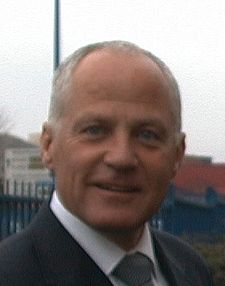 |
| Robert Segwanyi |
- New updates are here.
The deferment comes after the last minute intervention of Segwanyi's MP, Mike Hancock, as well as the MEP Michael Cashman. Many concerned people also wrote the British Home Secretary Theresa May over the past few days.
A new lawyer had been found today for Robert - who has been badly represented previously - but he did not have enough time in which to submit a judicial review application.
Robert was imprisoned and tortured for homosexuality. On escaping prison in June 2010 he fled to the UK and applied for asylum a fortnight later. The UK Border Agency (UKBA) does not accept he is gay and a judge rejected his appeal claiming that there is no risk to gay people in Uganda.
Hancock's letter demanded that Robert be given enough time to put in for judicial review - because, he explained in some detail, previous judicial dismissal of Robert's case appeared to be unsafe.
In particular he pointed to immigration judge Hembrough's treatment of the evidence of Professor Cornelius Katona, a Fellow of the Royal College of Psychiatrists, Emeritus professor of Psychiatry in the University of Kent, Honorary Professor in the Department of Mental Health Sciences at University College London and author of over 300 expert medical reports. (Katona's evidence wasn't available on Friday when we detailed other problems with both judge Hembrough's as well as the UKBA's treatment of Robert.)
Hancock pointed to the judge's statement in his ruling that Prof. Katona did not consider Mr Segwani to be gay - yet Prof. Katona has said that this is "with respect, incorrect".
Hembrough said he had “considerable doubts as to whether” Segwanyi was suffering from post-traumatic stress disorder (PSTD) – despite Prof. Katona saying that it would not even be possible for professional actors to fake PTSD symptoms in a way that Segwanyi did.
The treatment of Katona's evidence demands judicial review, Hancock says.
Further, he points out that Theresa May has said that "cases involving LGBT will be reviewed before final deportation." And Hancock wants an answer to his suggestion:
"That this case shows that the UKBA and the Home Office are institutionally homophobic and there should be better consideration of this case so that it can demonstrate that it is not."
 |
| Mike Hancock MP |
"Even if I am wrong regarding the Appellant's homosexuality I see no reason to depart from the [then] current country guidance" - this guidance being that "the evidence does not establish that in general there is persecution of homosexuality (sic) in Uganda".When, Hancock says, the situation for LGBT in Uganda was widely reported as worsening.
He notes that Professor Katona says that
Robert's prior argument was that the 'credibility' issues raised by UKBA were due to the interviewer mixing up his statements about his past relationships - and Prof. Katona says that Robert's understanding of English was poor and his spoken English also "very limited". The judge dismissed this evidence."Mr Segwani's Post-Traumatic Stress Disorder [means that] there is a strong possibility that his high levels of fear and stress may have led to his assenting to be interviewed in English without taking fully into account the disadvantages of doing so."
When Robert's case was last dismissed by UKBA 21 January reiterating the judge's ruling, Prof. Katona said:
"This assessment appears however to have ignored my expert clinical assessment."Commenting on the judge's decision, Hancock quotes the Public Law Project:
"Public bodies must correctly understand and apply the law that regulates their decision making powers. An action or decision may be unlawful if the decision maker had no power to make it or exceeded the powers given to him/her. Four kinds of illegal activity may be identified:...[including] taking irrelevant factors into account or failing to take account of all relevant factors."Hancock writes that Hembrough's findings about Segwanyi being interviewed in English, his PSTD and his homosexuality:
"Are at best based on somewhat prejudiced views and not in line with the evidence. Indeed if Mr Segwanyi had wanted to mislead the immigration authorities he would surely have acted in a different way."Hancock quotes from Stonewall's Report 'No Going Back' that "some appeal judges' attitudes to LGBT are "old-fashioned"." And he highlights a quote from the report from another Ugandan asylum seeker who said:
"My lawyer asked whether I could change my case and claim on political grounds instead. She said it's hard to represent me properly with the case of being gay."








![Reblog this post [with Zemanta]](http://img.zemanta.com/reblog_e.png?x-id=d3497988-b867-40ee-b88b-01cf4d486418)
![Reblog this post [with Zemanta]](http://img.zemanta.com/reblog_e.png?x-id=fc303939-0e51-4968-9e90-b74d439f9795)


![Reblog this post [with Zemanta]](http://img.zemanta.com/reblog_e.png?x-id=7d371186-c2cb-45ad-b7cc-8b369a314d85)











 Join our page
Join our page

